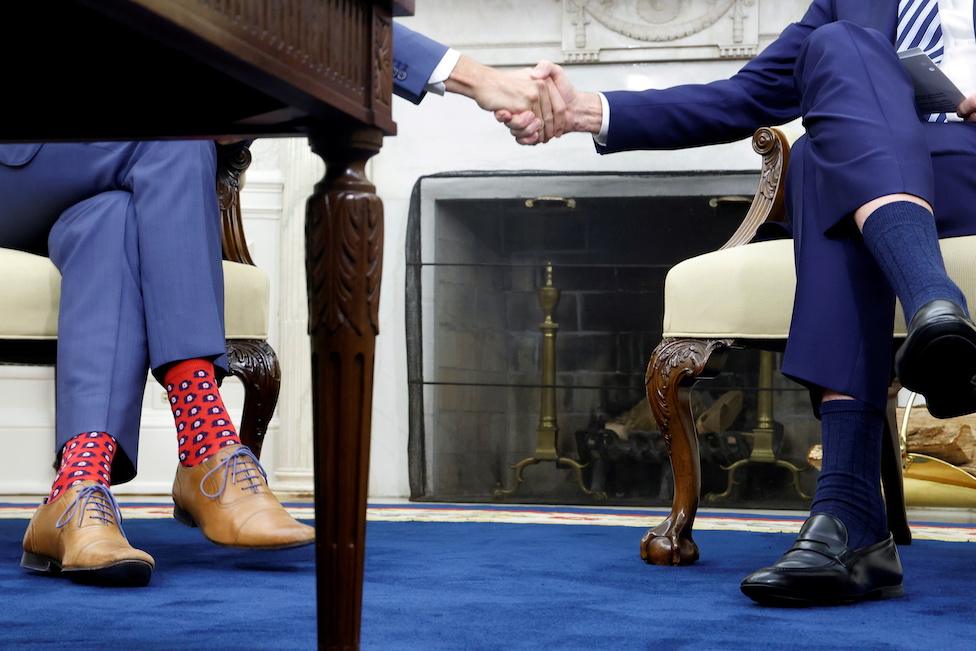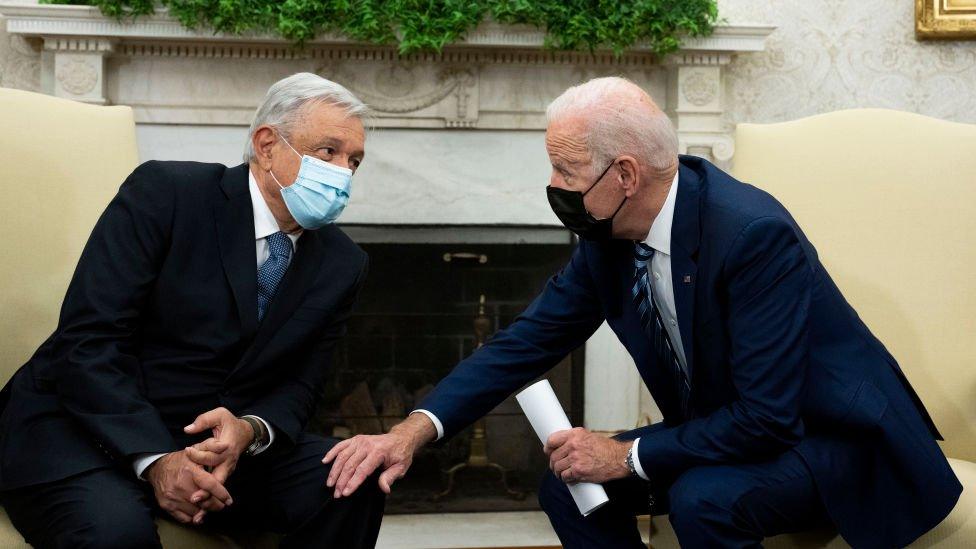Three Amigos summit: Awkward conversations for US with its neighbours
- Published

Pulling their socks up for Canada and US - Trudeau and Biden in the Oval Office
If Joe Biden was looking for respite from the tricky global challenges he has faced in recent months, he may not find harmony closer to home. The leaders of US, Canada and Mexico met on Thursday in Washington, with plenty differences to resolve.
It was the first such gathering since 2016. Talks were expected to focus on migration, Covid-19, and trade subsidies, among other issues.
At the White House, Mexico's President Andrés Manuel López Obrador praised the "new era" in relations with the US, and noted the respectful relationships between past US and Mexican presidents.
Speaking to Canadian Prime Minister Justin Trudeau earlier, Mr Biden said: "This is one of the easiest relationships that we have."
Our correspondents in Toronto, New York and Mexico City give their perspectives on this year's so-called Three Amigos summit.
Canada
By Robin-Levinson King, Toronto
There are many things that America and Canada agree upon - but one area of disagreement seems to be drawing the most focus.
In a White House appearance ahead of their formal talks, Prime Minister Trudeau and President Biden reiterated their close alignment on climate change and the pandemic. But it was a reporter's question about Mr Biden's proposed tax cut on electric vehicles (EVs) that exposed a major fault line in their relationship.
Mr Biden wants to give Americans a big tax credit to buy EVs - but only if they're made in the US.
This could mean Canada, which supplies billions of dollars-worth of parts a year to the US auto industry, will get cut out. Earlier today, Mr Trudeau said he was "a little bit concerned" about the credits, but did comment on the matter to reporters.
Mr Biden said the issue is not settled, since the credit is attached to his $1tn (£741bn) social spending bill, which is still before Congress. "We're going to talk about that," he said.
US
By Laura Trevelyan, New York correspondent
Sometimes in diplomacy the substance comes in the choreography.
And so the first North American leaders' summit in five years was a statement by the three leaders about the importance of this strategic relationship, regardless of tensions over migration and protectionism - and by hosting, President Biden could underline his claim that America's back, even after a rocky summer with the chaotic and deadly withdrawal from Afghanistan.
Amid a rise in competition from Europe and Asia, this was a show of solidarity by the leaders of a huge trading bloc.
The record surge in migrants at the US Mexico border is of key importance to the Biden administration - but there was no obvious progress at this summit.
The leaders agreed on to form a working group to address regional supply chain issues, and they struck an agreement to share vaccines.
The resurrection of this grouping after the America First Trump years was almost the point.

US President Joe Biden (right) meets with Mexican President Andres Manuel Lopez Obrador in the Oval Office
Mexico
By Will Grant, Mexico City
While the body language around the first meeting of its kind in five years was warm, there may have been some bruising conversations for the Mexican President behind the smiles.
Immigration remains the dominant issue whenever the two sides meet at present. But there were trade wrangles to discuss too.
A group of seven Democratic lawmakers wrote to Mr Biden ahead of his meeting with President Andrés Manuel López Obrador - or Amlo, as he's known in Mexico - to raise their concerns over Mexico's energy laws.
They cited "a slew of administrative and regulatory actions against private investors", saying President López Obrador has "spearheaded major amendments" to two energy law in favour of state-run firms and against private companies.
Others in the House of Representatives and Senate wanted Mexico to be tackled over human rights abuses being perpetrated by the security forces.
Life after deportation: 'I am living the Mexican dream'
And the Homeland Security Secretary, Alejandro Mayorkas, chose this moment to announce a Federal Officers and Employees Protection Act which "ensures US criminal law applies extraterritorially to those who serve the United States and its territories overseas".
Amid much mutual mistrust, the Amlo administration has refused to grant visas to numerous DEA agents and some interpret the new act as a clear message to Mexico that DEA agents and others will be protected by the US, regardless of any Mexican intransigence over their paperwork.
Good to be in the same room after five years away then, but much still to solve between Mexico and its neighbours to the north.